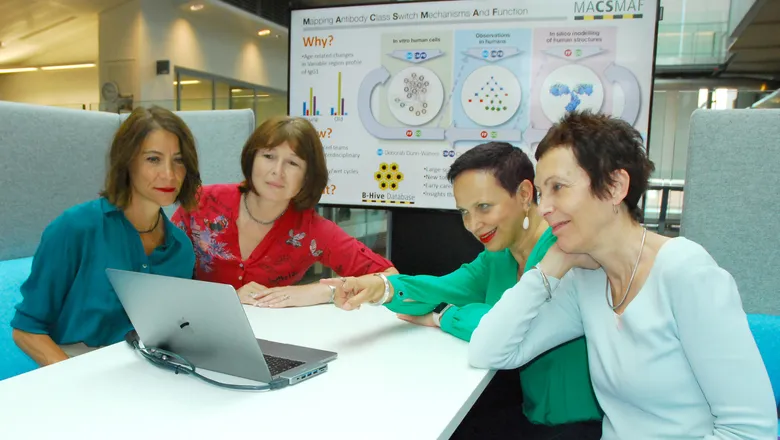I am very proud of this success, demonstrating that computational approaches play an essential role in the design and understanding of complex questions in modern biomedical research. The team will develop novel ways of working to generate data from human samples that will inform on the molecular mechanisms regulating the quality of antibody class switching, the in vivo dynamics and the extent of allosteric affinity/specificity effects of class switching. This is a truly multidisciplinary project which requires constant exchange and active participation of all the scientists involved.
Professor Franca Fraternali
15 October 2019
Professor Fraternali awarded funding to study how antibodies switch their function
Professor Franca Fraternali has been awarded a grant from the Biotechnology and Biological Sciences Research Council (BBSRC) to make major advances in understanding of the fundamental biology of living systems.

The project titled ‘Mapping antibody class switch mechanisms and function’ will investigate how antibodies can switch their function by switching class. Antibodies are produced by the immune system to target pathogens and can also be manufactured to treat diseases including cancer. Antibodies are extremely versatile and highly variable so they can recognise millions of different molecules, but they also have invariable segments (constant regions) that determine their function in the immune system. This project will reveal how switching of these constant regions is controlled.
This project is a collaboration between researchers at King’s College London, University College London (Professor Claudia Mauri and Professor Christine Orengo) and the University of Surrey (Professor Deborah Dunn-Walters) and led by Professor Franca Fraternali, Head of the Randall Centre for Cell & Molecular Biophysics.
The funding is part of a recent announcement from the BBSRC who have awarded £14M to four teams of researchers in the UK to work on four new large-scale projects. This leading-edge discovery research funded through the strategic Longer Larger (sLoLa) grants call.
BBSRC’s Executive Chair, Professor Melanie Welham, said, “Frontier Bioscience is all about pushing forward the boundaries of knowledge, often making unexpected and potentially world-changing discoveries. These four projects are supporting interdisciplinary teams, underpinning the importance of collaboration when tackling such complex questions. This investment continues our long-standing commitment to excellence in discovery research that has helped position the UK as a leading nation in bioscience.”
BBSRC’s vision is to push back the frontiers of biology to deliver a healthy, prosperous and sustainable future. These curiosity-driven projects continue our ongoing commitment to excellence in discovery research across the breadth of our remit, from molecules to systems. This investment through its Strategic Longer and Larger call advances this strategy for UK bioscience by furthering the revolution unfolding in our understanding of living systems, driven by new tools, technologies and interdisciplinary approaches.
Each of the funded projects brings together multidisciplinary teams to tackle significant fundamental scientific questions about antibody specificity, the extracellular matrix, protein abundance in plants and RNA splicing. The funding will enable teams of UK scientists to push the frontiers of human knowledge and make breakthrough discoveries that can eventually be harnessed to benefit our everyday lives.

